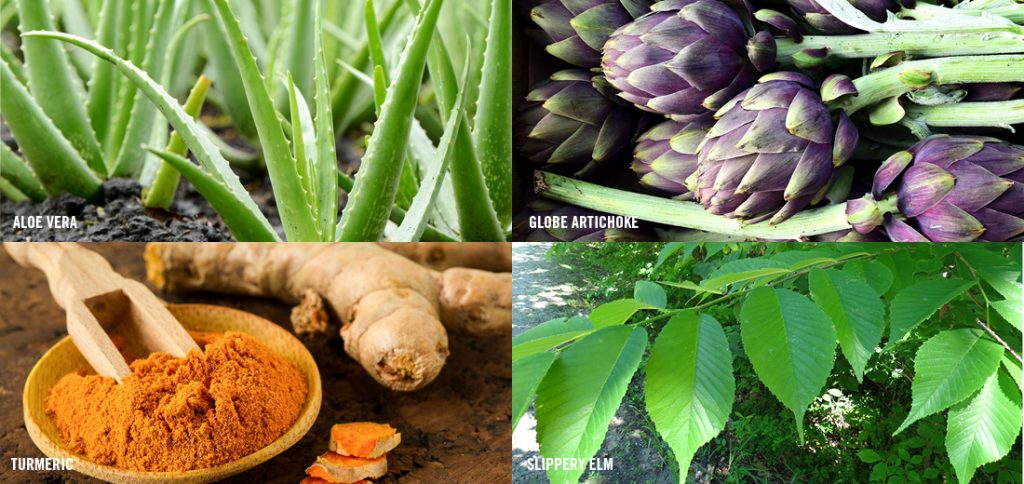
Are your joints noticing the change of season? Here’s what you can do…
July 9, 2018
How to look after your Gut Health – How Digestive Enzymes can help
September 5, 2018How to look after your Gut Health – Herbs and Nutrients that Support Digestive Health

Looking for extra gut health support?
In the first article of this “Looking after your Gut Health” series, we talked about the bare bones basics of supporting a healthy digestive system. If you missed that article, the short version is that it all begins with a healthy diet: one that’s low in sugar and processed food, and high in fibre and nutrients. Get that wrong, and the best natural health products in the world won’t help much.
However, if you’re already eating pretty well, there are other natural ingredients that can support your digestive system health. In this article, we’ll be covering a few of the herbs and nutrients that can help. First though, it might help to get a quick primer on what your digestive system actually includes to understand how and why each ingredient is beneficial.
Your digestive system is more extensive than you think
Your digestive system incorporates all the organs that convert the food you eat into the energy and nutrients your body needs to function. Most people think of this system as the long, twisty-turny ‘tube’ that runs from your mouth, down your oesophagus to your stomach and intestines, and out the other end. However, several organs that sit outside of this tube also play a big role in digestion[1]. Three of the key ones are your:
- Liver: this organ has many functions in your body, two of which relate to digestion. One is producing bile – a bitter, yellow-green fluid that helps to break down fats. The other involves helping to process the nutrients that your body extracts from your food once it reaches your small intestine.
- Gallbladder: this tiny organ basically exists to store and concentrate the bile that your liver creates until it’s needed for digestion.
- Pancreas: your pancreas secretes digestive enzymes that help your body to break down the macro-nutrients (carbohydrates, proteins and fats) in your food. We’ll be talking more about these enzymes in Article #3 of this series.
The various herbs and nutrients we’ll talk about in this article each support the digestive process in different areas of your overall digestive system.
Herbal support for a happy gut
Over the centuries, traditional herbalists from many cultures have used plants to help maintain people’s digestive health. Some of the best known include:
- Slippery Elm: traditional herbalists in many Native American tribes used a powder made from Slippery Elm bark to support digestive system comfort. The bark contains a substance called mucilage that forms a gel when it’s mixed with water. This gel can create a thin layer over the gut lining, soothing and nourishing the cells in the intestinal wall.
- Aloe Vera: the gel from the inner leaves of this succulent plant is rich in nutrients called polysaccharides, which support good levels of probiotic bacteria in your intestinal tract. (We’ll talk more about probiotics in Articles #4 and #5 of this series). The gel also has similar properties to the mucilage in Slippery Elm.
- Globe Artichoke: more than just food, Globe Artichoke leaves also contain bitter antioxidant compounds that support liver health and function.
- Turmeric: this golden yellow spice has been used for thousands of years to flavour Asian food, but it’s also rich in a powerful antioxidant compound called Curcumin. In recent times, Curcumin has been extensively studied for its benefits in supporting intestinal health and comfort.
Nutrients
In addition to herbs, certain nutrients have been researched and found to have properties that play roles in various parts of the digestive process. Three of these include:
- Glutamine: this essential amino acid provides a fuel source for the cells in your intestines and liver. Your body also uses Glutamine as a nutritional building block in its natural repair processes for the cells in your gut wall, which in turn supports gut lining integrity.
- Zinc: researchers have known that Zinc – a trace mineral with powerful antioxidant properties – supports immunity and general wellbeing for some time. However, more recent studies also suggest that good Zinc levels can support the balance of beneficial bacteria in your gut, and assist your pancreas with enzyme production.
- Prebiotics: prebiotics are nutrients that the probiotic bacteria in your intestinal tract feed on. Good levels of these nutrients create an environment in your gut that encourages beneficial bacterial to grow and thrive. Most prebiotics are soluble fibres, such as Pectin and Acacia.
The most convenient way to get all these ingredients…
If that sounds like a lot of ingredients to add to your diet to help maintain a happy digestive system, don’t worry – there are products out there that contain all of them (including our Gut Health powder). Another reason to not worry – stress can affect your gut health too. Gut health is a journey, and it’s important to take it one step at a time.
Ok – that’s part two wrapped up! We hope you’re learning something. Hit the button to read part 3.
[1] https://my.clevelandclinic.org/health/articles/7041-the-structure-and-function-of-the-digestive-system




